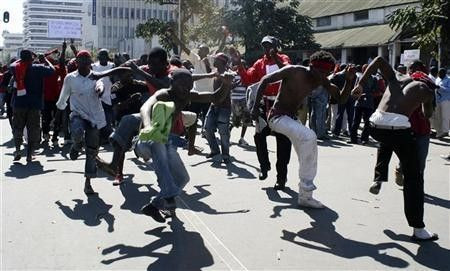Some Malawi groups could pull out of protests

Some leading Malawi rights groups said on Tuesday they could pull out of mass demonstrations scheduled for this week against President Bingu wa Mutharika as they await a court decision on whether the rallies would be legal.
Opposition groups have given the president a Wednesday deadline to listen to their demands, promising fresh protests if he does not address the chronic poverty that has ensnared most of the southern African country's 13 million people.
"The demonstrations have been postponed and not cancelled to allow the High Court to rule on the injunction and to allow time for mediation efforts to succeed," Rogers Newa chairman of the organising committee, said at news conference in Lilongwe.
Malawi police killed 19 unarmed citizens and shot 58 others during protests in July, the government's rights body said in a report on the unprecedented rallies against Mutharika's government.
Emmy Chanika, executive director for the Civil Liberties Committee, another leading group planning to take part in the rallies, told Reuters: "If the courts rule that we can go ahead, we plan to do so".
Civil rights groups want the president to declare his wealth, solve dollar and fuel shortages that have slammed the economy and restore diplomatic relations with the country's former colonial masters and major aid donor, Britain.
Some opposition leaders have called for rallies regardless of what the court decides -- handing out leaflets seeking support for street protests.
Banks and the U.N. agencies in the country plan to close on Wednesday due to rising tensions in the cities.
Police Commissioner Loti Dzonzi warned that anyone who goes on the streets faces arrest.
"Police will be very vigilant and expect people to behave and anyone seen to be protesting will be dealt with," Dzonzi warned.
International human rights group Amnesty International said protesters risk being shot dead unless police stop using live ammunition.
"The Malawian authorities must allow people to express their opinions without fear of violent reprisals or arbitrary arrests," Michelle Kagari, Amnesty International's deputy programme director, said in a statement.
Mutharika, a former World Bank economist, has seen his country lose close to $1 billion in foreign aid due to rising tension with donors made worse by his government's violent crackdown on the rallies.
Britain also suspended aid after Malawi expelled its ambassador during a diplomatic spat.
Mutharika has warned there could be more bloodshed if protests go ahead. The army said at the weekend it plans to step in if violence flares.
The aid freeze has left a yawning hole in the budget of a country reliant on handouts for 40 percent of its revenues, and intensified a dollar shortage that this week saw the government devalue its kwacha currency by 10 percent to 165 against the U.S. dollar.
© Copyright Thomson Reuters {{Year}}. All rights reserved.





















